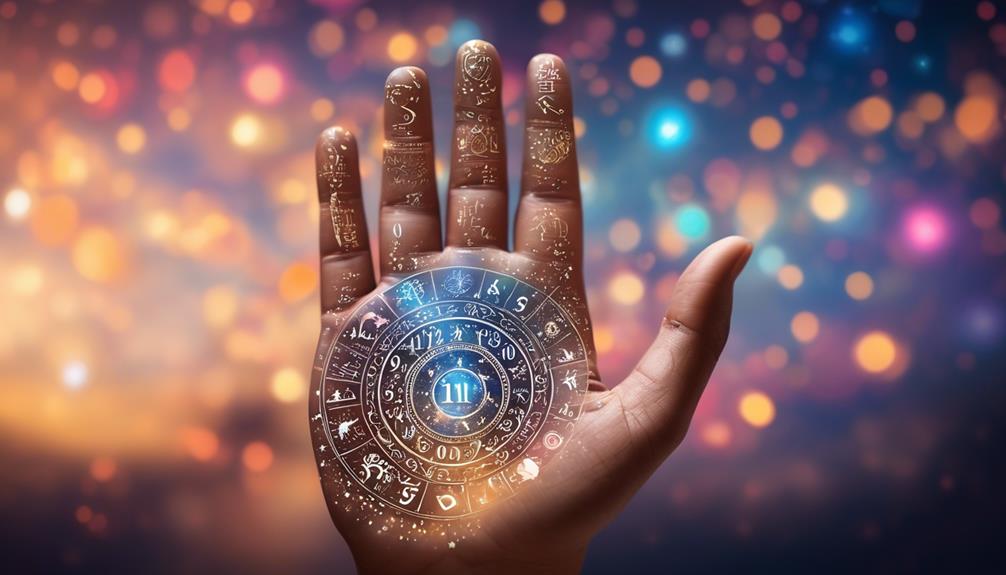Have you ever wondered about the significance of seeing repetitive numbers like 11:11 or 333?
These recurring sequences, known as angel numbers, hold deep cultural and spiritual meanings across various belief systems. From the Judeo-Christian tradition to ancient civilizations and indigenous cultures, the interpretation of angel numbers varies widely, shedding light on the universal fascination with these mystical phenomena.
But how exactly do different cultures understand and interpret these angelic messages?
Key Takeaways
- Angel numbers hold significant importance in both Judaism and Christianity, symbolizing messages from the divine and offering guidance and insight.
- In Kabbalah, angel numbers are assigned specific meanings and represent a mystical link between the physical and spiritual worlds.
- Kabbalistic numerology, known as Gematria, unveils hidden truths and insights through the interpretation of angel numbers.
- Angel numbers are not exclusive to Judeo-Christian traditions; they also have significance in Eastern philosophies and indigenous cultures, representing messages from the universe and interconnectedness of all things.
Angel Numbers in Judaism and Christianity

Angel numbers hold significant importance in both Judaism and Christianity, serving as divine messages communicated through repetitive number sequences. In Judaism, the study of Kabbalah reveals a deep connection between numbers and spiritual significance. These numbers are seen as a sequence that holds meaning beyond their numerical value, representing a connection to the spiritual realm and the universe.
In Christianity, the recognition of angelic beings as messengers of God is prevalent, and the Bible is often studied for its numerological significance. The number 7, for instance, is highly regarded, symbolizing perfection, completion, and divine fulfillment in both faiths. Angel numbers are believed to convey messages from the divine, offering guidance and insight to individuals on their spiritual journey. They're seen as a means of communicating new beginnings, encouragement, and divine intervention.
Within Biblical numerology, these sequences are interpreted as significant signs of spiritual guidance and divine presence in one's life.
Angel Numbers in Kabbalah
Now, let's explore the numerological significance within Kabbalah, where each number holds deep mystical meanings and connections to the spiritual realms.
You'll delve into the interpretation of angel numbers and the spiritual practices associated with understanding these divine messages.
Understanding angel numbers in Kabbalah involves interpreting the symbolic language of numbers within this mystical framework, revealing the profound spiritual energies and divine forces at work in the universe.
Kabbalah's Numerological Significance
Deeply rooted in the teachings of Kabbalah, numerological significance holds a profound place in understanding angel numbers. In Kabbalah, numbers are believed to contain divine messages from the spiritual realm. This concept of angel numbers represents a mystical link between the physical and spiritual worlds, signifying divine intervention and offering messages from the spiritual realm.
Kabbalistic numerology, also known as Gematria, assigns specific meanings to numbers, unveiling hidden truths and insights. Each number in Kabbalah carries unique energetic vibrations and symbolic representations, contributing to a deeper spiritual awakening.
Understanding angel numbers in Kabbalah involves recognizing the interconnectedness of the spiritual and physical realms through numerical patterns, providing a pathway to connect with the divine and gain profound spiritual understanding.
This numerological significance in Kabbalah offers a deeper insight into the concept of angel numbers, signifying their importance in spiritual growth and enlightenment.
Interpretation of Angel Numbers
Embedded within the teachings of Kabbalah, the interpretation of angel numbers reveals profound insights into the mystical significance of numerical symbolism.
In Kabbalah, understanding angel numbers involves recognizing that these numbers are seen as messages from spirit guides, conveying guidance and support. The interpretation of angel numbers often involves recognizing common angel numbers, such as 111, 222, and 333, each carrying specific meanings. This sequence encourages individuals to break down the meanings of each number and understand how they interact within the sequence.
In Kabbalistic teachings, the interpretation of angel numbers is crucial for comprehending the spiritual energies and symbolism associated with each number.
In Chinese culture, the interpretation of angel numbers aligns with the broader belief in the significance and power of numbers, emphasizing their spiritual and mystical connotations.
Spiritual Practices in Kabbalah
Spiritual practitioners in Kabbalah integrate angel numbers into their practices, attributing profound significance to specific number sequences. In Kabbalistic teachings, each number holds symbolic meaning and is believed to convey divine messages to individuals.
The interpretation of angel numbers in Kabbalah is deeply rooted in the mystical understanding of the universe and spiritual connections. Kabbalistic practitioners believe that understanding these number sequences can provide insights into one's life path and inner wisdom. They view repeating numbers as messages from the divine realm, guiding individuals towards new opportunities and good fortune.
This spiritual practice aligns with the beliefs of the philosopher Pythagoras, who emphasized the importance of numbers and their influence on human experiences. By incorporating angel numbers into their spiritual practices, individuals in Kabbalah seek to gain clarity, guidance, and a deeper understanding of the significance of numbers in their lives.
Angel Numbers in Islam
Angel numbers aren't a prominent aspect of Islamic teachings, which prioritize faith, prayer, and guidance from the Quran and Hadith.
In Islam, the focus is on seeking guidance and blessings through prayer and sincere devotion to Allah, rather than interpreting sequences of numbers as divine messages.
While the concept of angel numbers may not be emphasized, Muslims believe in the existence of angels as spiritual beings created by Allah to carry out various tasks and communicate His messages.
It's important to understand that Islamic beliefs prioritize seeking knowledge and guidance from the Quran and Sunnah, as well as understanding the significance of specific numbers in religious contexts.
In Islam, when faced with a repetitive number or a situation that prompts one to find significance in numbers, it's encouraged to turn to prayer and seek guidance from Allah.
Muslims are taught to pay attention to the signs and opportunities for personal growth and reflection that Allah provides, rather than interpreting these signs as angelic messages.
Embracing new life experiences, changing jobs, or noticing an angel in a dream are seen as opportunities for personal development and spiritual growth within the Islamic faith.
Angel Numbers in Numerology

In exploring the realm of numerology, the significance of angel numbers becomes a focal point for understanding the interconnectedness of spiritual and cosmic energies. Understanding angel numbers in numerology can provide profound meaning and support your spiritual journey.
Here's what you need to know:
- Manifestation and Positivity: Angel numbers in numerology are believed to carry the power to manifest positive thoughts. By recognizing and understanding these numbers, you can align your thoughts with the energies they represent, leading to a more positive mindset.
- Growth and Transformation: These numbers often signify the beginning of a new phase in life. They can serve as gentle reminders to embrace growth and transformation, guiding you towards personal development and self-improvement.
- Symbolism and Synchronicity: Angel numbers in numerology are filled with symbolism and synchronicity. They're thought to be messages from the universe, offering guidance and reassurance as you navigate through life's journey.
- Spiritual Significance: In numerology, angel numbers are seen as spiritual signposts, directing individuals towards a deeper understanding of themselves and their place in the universe. They can act as beacons of hope and encouragement, reminding you that you're never alone on your path.
Angel Numbers in Eastern Philosophies
When delving into Eastern philosophies, one encounters a profound interpretation of angel numbers as messages from the universe. In these philosophies, the belief in the interconnectedness of all things and the significance of synchronicity play a crucial role in the understanding of angel numbers.
The numbers are seen as a light from the universe, guiding you on your life journey and offering support and encouragement. It's a belief that doesn't require specific psychic abilities or metaphysical beliefs, making it accessible to all.
The meanings attributed to angel numbers in Eastern philosophies often emphasize the importance of personal resonance. When you encounter an angel number, it's an invitation to set an intention, to find your angel, to break through belief boundaries, and to embrace a new chapter in your life.
It signifies a fresh start, urging you to pay attention to the guidance being offered and to embrace the opportunities for growth and transformation that lie ahead.
Angel Numbers in Indigenous Cultures

You're about to explore the rich tradition of angel numbers in indigenous cultures.
Indigenous number symbolism and its spiritual significance in various cultures will be uncovered, shedding light on the unique interpretations and practices.
Understanding how angel numbers are perceived and used in indigenous communities will provide valuable insight into their spiritual beliefs and traditions.
Indigenous Number Symbolism
Indigenous number symbolism intricately weaves together the spiritual guidance and ancestral wisdom embedded in angel numbers within these cultures. In indigenous beliefs, the interpretation of recurring numbers holds significant cultural importance.
For instance:
- The number one represents individuality, independence, and new beginnings.
- Number two signifies balance, harmony, and partnerships.
- Number four is associated with stability, foundations, and the four directions.
- Number seven is considered sacred, representing spirituality, intuition, and inner wisdom.
In indigenous cultures, the pattern of numbers is believed to convey messages from the spiritual realm, offering guidance and protection. Understanding these angel numbers involves honoring the interconnectedness of all living beings and respecting the wisdom passed down by ancestors. These beliefs are often applied to everyday life, from interpreting the time on a digital clock to seeking spiritual insight.
Spiritual Significance in Cultures
Deeply rooted in the spiritual fabric of indigenous cultures, angel numbers hold profound significance as conduits of ancestral guidance and wisdom.
In many indigenous tribes and cultures, noticing specific angel numbers while driving or walking around is believed to be a sign from the spirit world. These numbers are seen as messages from ancestors or spirits, actively cheering individuals on their life journey.
Within indigenous beliefs, angel numbers are deeply intertwined with the understanding of the universe's signs and messages, representing the presence of ancestors or spirits offering support and wisdom.
The interpretation and significance of angel numbers in indigenous cultures are often passed down through oral traditions, rituals, and the wisdom of elders, showcasing the deep spiritual significance these numbers hold within these diverse cultures.
References
Dream Symbols and Angel Numbers
Disclaimer
The information in this article is offered solely for educational purposes and should not be considered a replacement for expert medical counsel, diagnosis, or care. Consulting a certified health professional is strongly advised prior to initiating any modifications to your health regimen or if there are any uncertainties or issues regarding your wellbeing. Zenaha holds no responsibility for any inaccuracies, oversights, or outcomes that may result from utilizing the information shared.